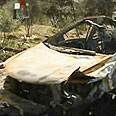
Syria says 'no truth' Israel targeted convoy
In letter to Ban Ki-moon, Syria's UN ambassador says alleged Israeli airstrike 'caused destruction and substantial material damage' to Jamraya military research center; claims Security Council's failure to condemn 'Israel's grave aggressions' would undermine regional, international peace
Syria's UN ambassador says there is "no truth" to reports that an Israeli airstrike last week which seriously damaged a scientific research center had targeted a convoy heading to neighboring Lebanon.
Israel has all but confirmed it was behind the Jan. 30 airstrike a few miles (kilometers) from the Syrian capital, Damascus. US officials said the Israelis struck a military research center and a convoy next to it carrying anti-aircraft weapons destined for the Islamic terror group Hezbollah in Lebanon.
Related articles:
- Watch: Syrian tries to slap Ahmadinejad with shoe
- Op-ed: Don't ignite entire region
- Analysis: Bloodshed to continue
Ambassador Bashar Ja'afari said in identical letters to Secretary-General Ban Ki-moon and the Security Council dated Jan. 31, and circulated Thursday, that Israeli aircraft flying at low altitude to avoid radar headed to the research center in Jamraya, Rif Dimashq, and bombed it, killing two employees and injuring five others. They returned by the same route over an area north of Mount Herman, he said.
"The attack caused destruction and substantial material damage not only to the center, but also to the adjacent technical development center and a parking garage," he said. "Syria emphasizes that there is no truth to the media reports asserting that the Israeli aircraft had targeted a convoy that was heading from Syria to Lebanon."
Syria called on the Security Council "to condemn unequivocally this blatant aggression by Israel against the territory of a sovereign state and its violation of the Charter of the United Nations" as well as international law, council resolutions, and the 1974 agreement that separated Israeli and Syrian forces in the Golan Heights following the 1973 Yom Kippur War.
The Security Council has been deeply divided over the two-year-old Syrian conflict, which has killed more than 60,000 people, according to the UN.
Site of the alleged strike
Russia, Syria's closest ally, has vetoed three Western-backed resolutions aimed at pressuring President Bashar Assad to stop the violence. After last week's Israeli airstrike, Russia tried to get the council to agree to a press statement, which needs approval from all 15 members, but the United States, Israel's closest ally, blocked it, according to diplomats, speaking on condition of anonymity because talks were private.

Area of strike, according to Syrian army statement
Ja'afari warned that the Security Council's failure to condemn "Israel's grave aggressions ... would lead to instability and undermine regional and international peace and security."
"Syria holds Israel, and those in the Security Council who are protecting it, fully responsible for the consequences of this aggression, and affirms its right to defend itself, its territory and its sovereignty," he said.
Ja'afari said the airstrike followed several failed attempts over a period of months by armed terrorist groups to enter and take control of the research center, "and occurred after Israel, in cooperation with states hostile to the Syrian people, had ordered its lackeys inside the country to strike selected vital Syrian military sites."
The "lackeys," headed by Jabhat al-Nusra, an al-Qaeda-linked group, attacked some sites in recent months, including air defenses and other vital locations, the Syrian envoy said, but "they have failed to strike the majority of them."
"These determined efforts and the subsequent attack by the Israeli aircraft against the scientific research center prove beyond a doubt that Israel is instigating, benefiting from and, in some instances, carrying out, whether directly or through its lackeys on the inside, the terrorist attacks against Syria and its people," Ja'afari said.















